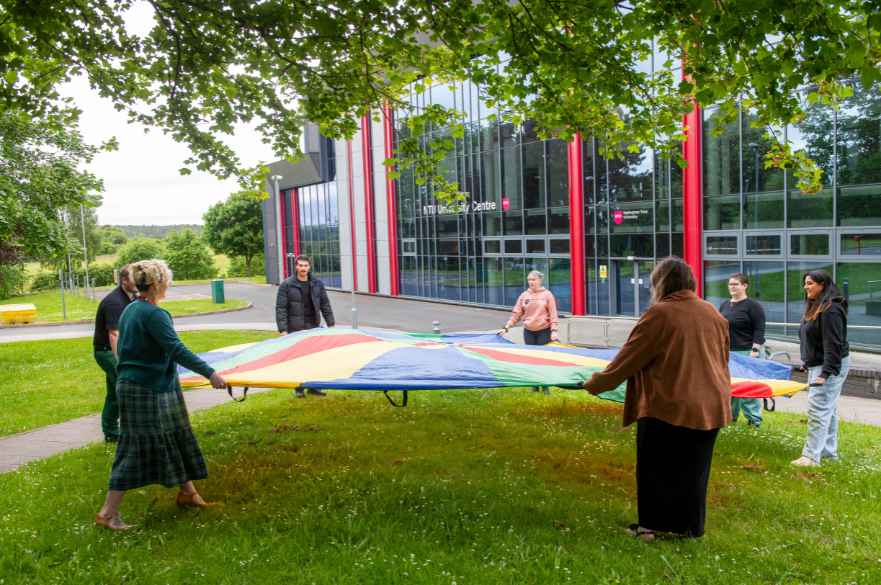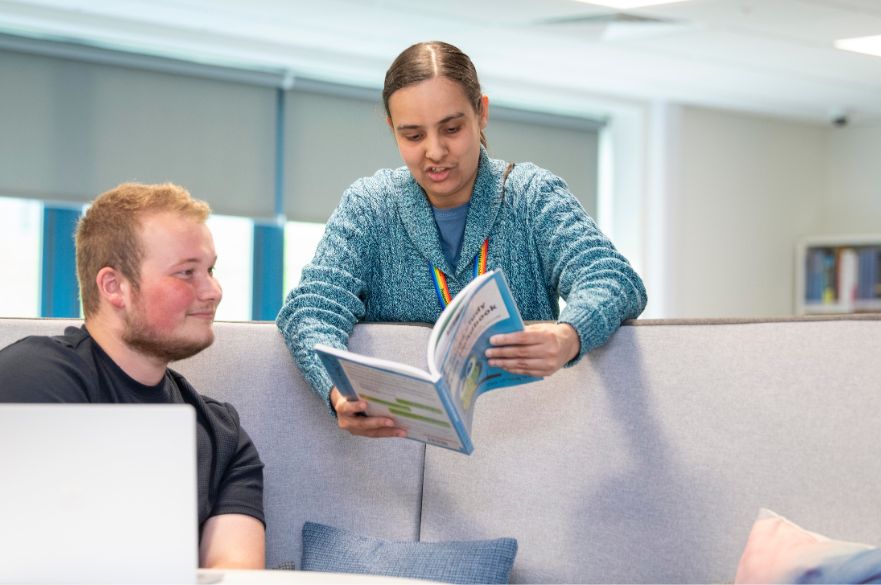Education: Policy and Practice FdA
About this course
This course is designed for people already employed in education roles and draws on the knowledge and experience gained through this employment. It specifically intends to meet the needs and interests of those who want to combine employment with further learning to enhance their future career. Students must be employed in an education setting for a minimum of 15 hours a week for the duration of the course.
This two year, part-time foundation degree is designed to support, develop and extend your academic learning as a foundation for professional development. You will undertake small tasks and projects within your own working environment to support module sessions and assignments.
It is ideal for a range of practitioners including:
- teaching and learning support assistants
- learning mentors
- extended school activity workers
- subject technicians
- support workers in alternative education settings
It may also be of interest if you are employed in a wider learning support/education role.
What you’ll study
We are currently reviewing the content of our courses to ensure that they remain relevant and current to our students’ future ambitions and society. Please continue to check this course webpage for the latest developments.
In Year One, through a reflective approach you will explore the impact of education policy on practice, communication and management of learning and creating an ethos of education for all. In Year Two you will focus on technology in learning and the wider context of learning in non-traditional educational settings. In Year One you will study 120 credits at level 4 and in Year Two, you will study 120 credits at level 5.
Throughout this year, you will develop your knowledge and understanding of education policy and practice. There are four modules this year:
Education: Policy and Practice (20 credits)
This module aims to:
- Introduce you to the ways in which education policy influences your practice.
- Give you the opportunity to examine how education is shaped by the wider social and political environments.
- Give you the opportunity to explore the relationships between policy development at an institutional, macro-level and its impact at classroom, micro-level.
Equality and Social Justice (40 credits)
This module aims to give you the opportunity to:
- Research issues of equality and social justice and marginalised individuals in education and society using relevant literature.
- Undertake an exploration of the issues affecting equality of education and social justice for all.
- Engage in looking at what these concepts mean in the context of education and how to put them into action.
Communication (40 credits)
This module aims to give you the opportunity to:
- Explore the important of communication in education.
- Develop and practice strategies to support learning including: the use of language and media resources to clarify knowledge and concepts.
- Develop strategies to promote positive behaviour through understanding cultural, social and emotional aspects of development.
- Apply knowledge of development to identify how to provide for learning and to identify when additional intervention is required.
- Effectively use different modes of communication to work effectively within a multi professional context.
Management of Learning 1 (20 credits)
This module aims to give you the opportunity to:
- Reflect on planning, organising and managing an effective learning environment.
- Address the principles of adult learning (andragogy) and see how they link to the principles of learning experiences of children (pedagogy).
- Contextualise theoretical concepts and facilitate the development of practical skills, involving individual or group work and problem solving approaches.
- Reflect the application of theoretical approaches to practice in supporting learning and development.
There are three modules in Year Two. These modules will embed academic skills, skills for employment, research skills, globalisation and sustainability in education. At the end of this year, you will undertake a synoptic review of your learning and identify current and future skills for employment and further study.
Management of Learning 2 (40 credits)
This module aims to give you the opportunity to:
- Deconstruct the notion of managing learning depends on how learning is defined and how it is managed by using relevant theorises and practice of educational management, leadership in educational management and strategy, policy and planning.
- Examine the ideas of communication, managing professional development and accountability in education.
- Critically examine and reflect on theoretical perspectives and apply these to practice through discussions within seminars, case studies and dialogue and reflection with tutors and your own work colleagues.
- Explore how to manage learning in different education environments drawing on various policies and literature to critically reflect on your practice.
Technology in Learning (40 credits)
This module aims to give you the opportunity to:
- Explore the role of technology in education drawing on various policies and literature to critically reflect on your practice.
- Examine the use of technology in a variety of contexts - mainstream, SEN and others.
- Debate the conflict between traditional assessment and innovative techniques.
- Use technology in the course, for instance Thinglink and Padlet, Lynch.com.
Learning in a wider context (40 credits)
This module aims to give you the opportunity to:
- Examine the wider landscape and understand the role of working more collaboratively across different agencies and the opportunities and challenges this poses against the backdrop of government policies and the White paper promoting partnerships.
- Develop skills and knowledge to support learning and teaching in different contexts by studying a multidisciplinary theoretical approach to education.
- Identify student's own skills set and reflect on alternative careers in the education sector.
We regularly review and update our course content based on student and employer feedback, ensuring that all of our courses remain current and relevant. This may result in changes to module content or module availability in future years.
Don’t just take our word for it, hear from our students themselves
How you're taught
Sessions run in the evenings and include seminars and tutorials, supported by work-based practice. Full support of your manager is required to allow work-based activities linked to your study.
Studying away from the University campus is made easy with NOW – the NTU Online Workspace. It offers you course and module information, the ability to upload assessments and receive feedback, as well as store personal files. NOW can be used anywhere that you have an internet connection.
Learn from our experienced staff
Our tutors are all experienced professionals who contribute to research and development within their specialist fields. Their research and influence not only shapes new educational practice, but also feeds directly into our courses, keeping you at the forefront of policy and practice.
How will I be assessed?
The course uses a range of assessment techniques to enable you to meet the learning outcomes and develop suitable skills for employment in education. Subject knowledge, understanding and transferable employment skills are assessed through practically based assignments. Assignments include presentations, reports, essays, portfolios, work based practice reflection.
Work based practice is not assessed as all course members are employed or volunteer members of staff whose practice is appraised within their own setting. However, to develop your practice, you are required to reflect critically on your work as an education practitioner.
Placements
You are expected to be in employed in an educational support role and therefore no placements are required.
How you're assessed
- Year One coursework (100%)
- Year Two coursework (100%)
Contact hours
You will have around 10 – 12 hours per week of contact time (lectures, seminars or workshops) with our teaching staff which is around 30% of a full-time week. Approximately 90% of our teaching is in-person. The remaining 70% of your time will be devoted to independent study.
Careers and employability
This course is designed to support, develop and extend the academic learning of practitioners working in education and community settings. It offers a foundation for professional development.
Links with industry
We involve industry experts in our courses in a number of ways.
- We consult with employers when we design and update our courses.
- We ensure you are prepared to meet the demands of the workplace by continually checking the currency and validity of our courses with employers.
- Employers may input directly into your course through guest lectures, projects, and other work-related activities.
Learn a new language
Alongside your study you also have the opportunity to learn a new language. The University Language Programme (ULP) is available to all students and gives you the option of learning a totally new language or improving the skills you already have.
Learning a new language can:
- enhance your communication skills
- enrich your experience when travelling abroad
- boost your career prospects.
Find out more about the University Language Programme.
If you’d like to know more about NTU’s groundbreaking Employability Promise, and the support you’ll receive both during and after your course, visit our Careers and Employability page.
Campus and facilities
You’ll mainly be studying in the Ada Byron King building, home to Nottingham Institute of Education.
Our self-contained, community-focused Clifton Campus has been designed to keep our students busy between lectures. Catch-up with your coursemates in the Pavilion’s barista café and Refectory; brainstorm group presentations in chic and stylish study spaces; enjoy some proper R&R in The Point, home of our Students’ Union. The campus also hosts the multimillion-pound Clifton Sports Hub, offering great options for everyone — whatever your interests, and however competitive you’d like to get!
You’re also right next to the bright lights of Nottingham — one of Britain’s top 10 student cities, and one of Europe’s top 25. All through termtime, a dedicated on-campus bus service will get you to the heart of the action (and back) in under 25 minutes. You’ll find a city stuffed with history, culture, and well-kept secrets to discover at your leisure: enjoy lush green spaces, galleries, hidden cinemas and vintage shopping by day, and an acclaimed food, drink and social scene by night.
Take our virtual tour to get a real feel for the campus.
Entry requirements
UK students
Standard offer: Level 3 qualification in an Educational subject, e.g. A-level, BTEC, CATCHE, or NVQ
Other requirements: GCSE English and Maths grade C / 4, full support from your manager to allow you to undertake work-based activities, one year's work experience in a related role (minimum 15 hours per week); and current employment in a related field.
Additional requirements for UK students
There are no additional requirements for this course.
Meeting our entry requirements
Hundreds of qualifications in the UK have UCAS Tariff points attached to specific grades, including A-levels, BTECs, T Levels and many more. You can use your grades and points from up to four different qualifications to meet our criteria. Enter your predicted or achieved grades into our Tariff calculator to find out how many points your qualifications are worth.
Other qualifications and experience
NTU welcomes applications from students with non-standard qualifications and learning backgrounds, either for year one entry or for advanced standing beyond the start of a course into year 2 or beyond.
We consider study and/or credit achieved from a similar course at another institution (otherwise known as credit transfer), vocational and professional qualifications, and broader work or life experience.
Our Recognition of Prior Learning and Credit Transfer Policy outlines the process and options available for this route. If you wish to apply via Recognition of Prior Learning, please contact the central Admissions and Enquiries Team who will be able to support you through the process.
Getting in touch
If you need more help or information, get in touch through our enquiry form.
International students
This course is not suitable for tier 4 visa applicants.
We accept qualifications from schools, colleges and universities all over the world for entry onto our undergraduate and postgraduate degrees. If you’re not sure how your international qualification matches our course requirements please visit our international qualifications page.
Additional requirements for international students
There are no additional requirements for this course.
English language requirements
View our English language requirements for all courses, including alternative English language tests and country qualifications accepted by the University.
If you need help achieving the language requirements, we offer a Pre-Sessional English for Academic Purposes course on our City campus which is an intensive preparation course for academic study at NTU.
Other qualifications and experience
If you have the right level of qualifications, you may be able to start your Bachelors degree at NTU in year 2 or year 3. This is called ‘advanced standing’ entry and is decided on a case-by case basis after our assessment of your qualifications and experience.
You can view our Recognition of Prior Learning and Credit Transfer Policy which outlines the process and options available, such as recognising experiential learning and credit transfer.
Sign up for emails
Sign up to receive regular emails from the International Office. You'll hear about our news, scholarships and any upcoming events in your country with our expert regional teams.
Getting in touch
If you need advice about studying at NTU as an international student or how to apply, our international webpages are a great place to start. If you have any questions about your study options, your international qualifications, experience, grades or other results, please get in touch through our enquiry form. Our international teams are highly experienced in answering queries from students all over the world.
Policies
We strive to make our admissions procedures as fair and clear as possible. To find out more about how we make offers, visit our admissions policies page.





